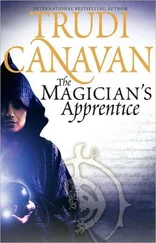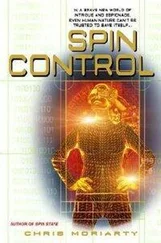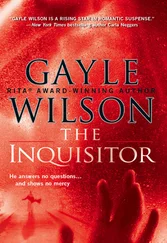“Because Kabbalah isn’t mere charms and trickery. It’s the manipulation of the letters of the names of God! If you use God’s name as a spellbook, you’ve turned him into a mere device. Is that an occupation worthy of a pious Jew?”
“So the more magic you know, the less you can use it?” Sacha asked disgustedly. “What’s the point of that?”
Rabbi Kessler rubbed at his head until his wispy hair stood on end with static electricity. “Mo, help me out!”
“Look at it this way,” Mo said in his usual levelheaded, reasonable tone. “Say you’ve got two friends. One of them spends time with you every week. You know, just hanging out, having a sandwich, taking in a matinee, playing cards … being together for the sake of being together. But the other friend only shows up when he needs to borrow money. Pretty soon you’d start to get a feeling about these two guys. Like that one of them’s your real friend, and the other one’s just a mooch. So that’s why Kabbalists don’t work magic. We’re God’s real friends.”
Sacha shook his head in bewilderment at the image of God playing cards with Mo Lehrer — just two paunchy middle-aged Jewish guys kicking back around the kitchen table with their undershirts untucked and their suspenders hanging around their knees.
“But can’t God tell the difference between someone who’s just using him and, well, I don’t know, let’s say … a faithful Jew who happens to need a really big favor for a really good reason?”
“Easy for you to say,” Grandpa Kessler pointed out. “But who decides what’s a good reason? And how do you know who else God has to stick it to in order to grant your prayer? Working miracles is like letting out a pair of pants: You can only stretch the fabric of the universe so far before you run out of cloth. after that, you’re stuck deciding whether you want cold ankles or a cold tushie.”
Mo cleared his throat and nodded toward the other side of the room where the rest of the class was staring curiously at them.
“So!” Grandpa Kessler said in a voice so loud that even the few students who hadn’t been eavesdropping jumped guiltily. “I take it you fellows are masters of Kabbalah now? You’ve set all the Worlds aright, and defeated the Other Side, and we can expect the Messiah any minute?” He glared sternly at them — or at least sternly for him. “No? then stop gawping and get back to your books!”
“But I don’t get it,” Sacha said when the class had bent over their books again. “Kabbalists can’t use magic because it interferes with God’s plan for the universe, but—”
“Oh, God has a ‘plan’ now, does he? What do you think he is, a building inspector?”
“But how is evil ever supposed to be defeated if the bad people use magic all the time and the good people aren’t even allowed to use it to fight them?”
Rabbi Kessler’s only answer was a fatalistic shrug. “What do you want from me? We’re in goles , exile. Life is supposed to stink. If you want to reform the world, go down to the Café Metropole and talk politics with your no-goodnik Uncle Mordechai!”
Sacha still thought this sounded crazy, but he knew it was pointless to argue. “So then what’s going to happen to Edison?”
“He’s a goner,” Grandpa Kessler announced cheerfully. “And, frankly, it sounds like it couldn’t happen to a nicer guy.”
Mo clarified. “Every time Edison has an impious thought or does an immoral deed, he’ll get weaker and his dybbuk will get stronger. Soon the dybbuk will be as solid as you and me. Then it will start to ooze its way into Edison’s life like a fungus. he might come home one night and find the dybbuk sitting down at his dinner table with his family. His friends and family will start mixing them up. Pretty soon they’ll start thinking he’s the fake and the dybbuk’s the real man. Day by day, the dybbuk will suck the life out of him, just like you’d suck an egg cream up through a straw. Soon he’ll be nothing but a kelippah: a dry scrap of skin with no soul left inside of it. Until one day … pfft! Gone!”
Finally Sacha put his finger on what had been bothering him about all of this. “But … how can the dybbuk fool everyone into thinking it’s Thomas Edison when it doesn’t even look like him?”
Mo and Grandpa Kessler were suddenly both very still. And they were both staring hard at Sacha with a look in their eyes he’d never seen before. Sacha remembered what his father had said about how no cheap hexer would mess with a Kessler. Now he could see why.
He cleared his throat and tried to speak in a normal voice. “You’re talking about Edison’s dybbuk as if it’s some kind of twin or double. But it isn’t. It doesn’t look anything like him.”
“Then it’s not his dybbuk,” Rabbi Kessler said.
“Are you sure about that?”
“What do you mean, am I sure? Your dybbuk is part of you — all your fear and anger and weakness. A dybbuk is the dark half of your soul, ripped out of your body and set against you. So how can your own soul not look like you?”
Sacha’s stomach turned over. “But then … whose dybbuk is it?”
“How should I know? You’re the one who’s seen it! Who does it look like?”
“It’s hard to tell,” Sacha began. “It’s all fuzzy. You know, like an old—”
He had been about to say like an old photograph . But then he stopped short as he realized which old photograph the dybbuk’s face reminded him of: the one of Rabbi Kessler as a beardless young man that hung over the mantlepiece in the Kessler’s Kitchen.
“What’s wrong, Sachele?”
But Sacha didn’t answer. He was too busy staring at his grandfather’s familiar face and seeing his features in a new light — the hazy halo of gaslight. And suddenly he realized that who the dybbuk looked like was the last thing on earth he wanted to discuss with his grandfather.
CHAPTER SIXTEEN. Some Old Goat Named Kessler
TO SACHA’S RELIEF, Wolf began his hunt for a Kabbalist not on Hester Street but on the Upper East Side — a neighborhood where Sacha was blessedly certain they wouldn’t run into anyone who’d ever heard of Rabbi Kessler.
First they visited a Jungian Kabbalist — a wild-eyed fellow with alarming eyebrows who kept insisting that the dybbuk was an instantiation of Edison’s “Shadow Self” and Edison’s only hope of salvation was to immerse himself in the “Collective Unconscious” and embrace his “Anima.” Then came the Freudian Kabbalist, whose ideas about dybbuks practically set Sacha’s ears on fire. And then came the Analytical Kabbalist, who inflicted page after page of alchemical calculus on them. Sacha didn’t have to imagine what Rabbi Kessler would say about alchemical calculus, because he’d already heard the speech too many times to count: “God created the Universe in plain Hebrew, and any fool who thinks he knows enough to check God’s math deserves whatever he gets.”
By the time they staggered up to the last address on Wolf’s list, Sacha had sore feet and a splitting headache.
“Wow!” Lily said when they first walked in. “It’s like a cathedral!”
She was right. If Sacha hadn’t looked closely enough to notice the discreet Stars of David carved into the gothic arches, he would never have known it was a synagogue at all.
The rabbi’s office looked like a fancy New York architect’s idea of an English country house. Inside, a cheerful fire crackled in the hearth. Outside, red-branched cherry trees swayed in a fall wind that carried the faint promise of snow. The chairs were upholstered in nut-brown leather. The walls were covered with paintings of foxhounds and racehorses. And the books in the oak bookshelves ran more to the collected works of Dickens than to Talmud and Kabbalah.
Читать дальше












